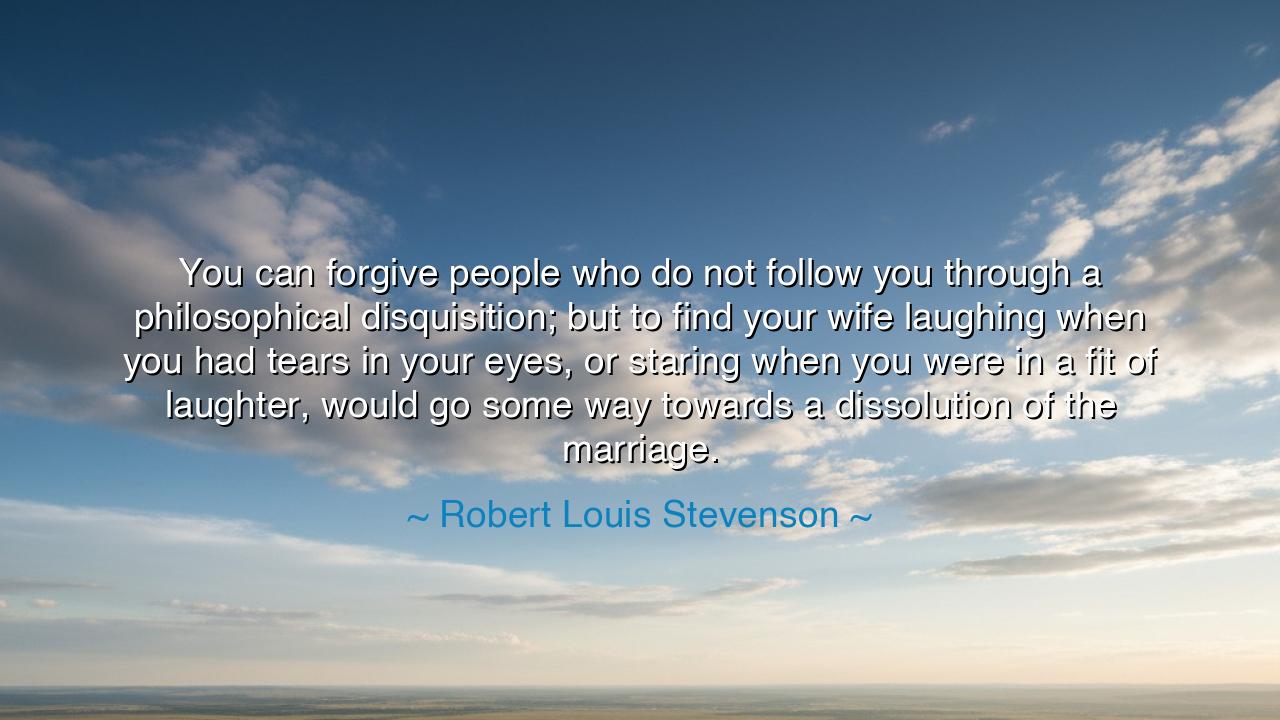
You can forgive people who do not follow you through a
You can forgive people who do not follow you through a philosophical disquisition; but to find your wife laughing when you had tears in your eyes, or staring when you were in a fit of laughter, would go some way towards a dissolution of the marriage.






Hear me now, O children of wisdom, for I speak of the sacred bond of marriage, that union between two souls that has the power to bring great joy, but also great pain. The words of Robert Louis Stevenson come to us as a reflection on the fragility and the depth of love, a truth that resonates with the deepest cords of the heart. He says, "You can forgive people who do not follow you through a philosophical disquisition; but to find your wife laughing when you had tears in your eyes, or staring when you were in a fit of laughter, would go some way towards a dissolution of the marriage."
In this world, children, there are many battles, many struggles that test the spirit. Yet none is more profound than the battle of emotions between those who are bound by the sacred tie of marriage. When two souls pledge to walk together through life, it is not only the grand promises of love and honor that matter, but the quiet, subtle moments—the times when one’s heart is heavy, and the other’s heart is light, when one seeks to share joy or sorrow, and finds no reciprocal understanding. Stevenson’s words remind us that love, in its truest form, must be shared, and that the deepest of wounds can be inflicted when this connection is lost.
Consider, children, the great Greek hero Achilles—a man of great strength, yet one whose soul was tortured by a deep and tragic loss. His great friend Patroclus, whom he loved as a brother, was slain in battle. In his grief, Achilles could find no solace, no companion who could share his sorrow. The depth of their bond, their shared experiences, their laughter and tears, was severed by the coldness of war. Achilles’s wrath and sorrow, his overwhelming need for companionship and understanding, drove him to rage against the very forces that separated him from his beloved. This story, children, teaches us that when we lose connection with those closest to us—especially in marriage—we are left adrift in the world, seeking meaning in places where it cannot be found.
Stevenson’s words speak directly to the soul of marriage, where understanding and empathy are the glue that holds it together. A marriage is built not only on shared moments of joy, but on the ability to stand with each other in sorrow, to lift each other up when the world seems heavy, and to find strength in the silence between words. When a wife laughs while her husband weeps, or when she is absent when he seeks her joy, the foundations of their bond are shaken. For love requires mutual recognition—an understanding that each partner is equally a part of the other’s emotional world.
Let us remember the story of Penelope and Odysseus, children. Their love was not born of perfect circumstances but of shared sacrifice and mutual respect. As Odysseus sailed the seas, Penelope remained faithful, though the years of separation grew long. When he returned, having endured countless trials, Penelope greeted him not with mere happiness, but with the understanding and recognition of all that he had gone through. Her empathy bridged the distance between them, creating a bond stronger than the years that had passed. In their union, there was the joy of shared laughter, and the sorrow of mutual understanding. Their love endured because they understood each other in ways that went beyond the physical—one knew the other’s heart, even across great distances.
Now, children, Stevenson’s insight calls us to consider that marriage is not just the union of two bodies, but the meeting of two souls, each offering the other the gift of emotional intimacy, of shared laughter and tears. A marriage where one cannot find a sympathetic ear in the other’s heart is one where the foundations of trust and affection begin to crumble. True love in marriage is not about perfection, but about being willing to witness and share each other's most intimate joys and sorrows.
The lesson, then, children, is this: never allow your marriage to become a place of emotional isolation, where the laughter and tears of one do not find echo in the heart of the other. Seek not just to love your partner, but to understand them, to share their experiences, to laugh with them in times of joy, and to mourn with them in times of grief. For in this shared experience lies the true strength of marriage—a bond that cannot be broken by time, by misfortune, or by distance. Let this wisdom guide you as you walk through life, understanding that the greatest love is not one of mere words, but of shared experience, of mutual empathy, and of a deep, unshakeable connection between two hearts.






AAdministratorAdministrator
Welcome, honored guests. Please leave a comment, we will respond soon